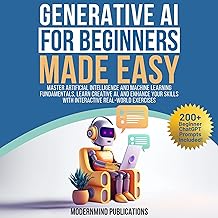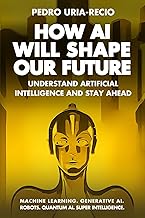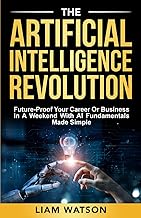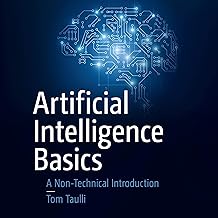Artificial intelligence has rapidly evolved from science fiction to everyday reality. As an AI researcher and language enthusiast, I’ve observed a fascinating linguistic shift I call “AI-ism” – a new way of speaking about technology that’s reshaping our vocabulary and thought processes.
Articles similar to this one can be found at: https://aiismsforbeginners.com/

The Birth of a New Language
AI-ism traces it’s roots to the 1956 Dartmouth Conference, where John McCarthy coined the term “artificial intelligence.” However, it’s only in recent years that AI-related language has truly permeated everyday conversation.
Several factors have contributed to this explosion of AI terminology:
Technological Leaps
The 2010s saw major breakthroughs in deep learning techniques, enabling machines to recognize speech, translate languages, and generate human-like text with unprecedented accuracy. These advancements captured public imagination and sparked extensive media coverage.
Increased Accessibility
AI technologies have become widely integrated into consumer products. Virtual assistants like Siri and Alexa have brought AI into our homes, while recommendation algorithms shape our online experiences.
This widespread exposure has familiarized the general public with AI concepts.
Cultural Impact
Science fiction and popular media have played a crucial role in shaping public perception of AI. Films like “Ex Machina” and TV shows like “Westworld” have introduced complex AI concepts to mainstream audiences, often blurring the lines between current capabilities and speculative futures.
The Vocabulary of AI-ism
AI-ism phrases typically fall into several categories:
Technical Jargon
Terms like “machine learning,” “neural networks,” and “deep learning” have become increasingly common in both technical and popular discourse. While these terms have specific meanings within the field of AI, they’re often used more loosely in everyday conversation.
For example, you might overhear someone at a coffee shop say, “The app must use some kind of neural network to forecast my coffee preferences so accurately!” While this person may not fully understand the technical details of neural networks, they’re using the term to express a general idea of advanced prediction capabilities.
Make it easy on yourself. Get this resource: https://amzn.to/3DKYUos

Note: As an Amazon Associate, I may earn a commission from qualifying purchases.
Anthropomorphic Language
Many AI-ism phrases attribute human-like qualities to AI systems. We often hear people talking about machines “thinking,” “learning,” or even “feeling.” This anthropomorphization can lead to misconceptions about AI capabilities and reflects our tendency to understand new technologies through familiar human concepts.
Consider how we describe virtual assistants: “Alexa didn’t understand my question” or “Siri learned my schedule quickly.” This language implies a level of comprehension and cognition that current AI systems don’t possess, but it helps us relate to and interact with these technologies more comfortably.
Generative AI phrasings and acronyms creates a new ‘speak’ for some: https://amzn.to/3BWkFRG

Note: As an Amazon Associate, I may earn a commission from qualifying purchases.
Ethical and Philosophical Concepts
As AI systems become more advanced, we’re grappling with complex ethical questions. Phrases like “AI ethics,” “machine bias,” and “artificial general intelligence” reflect the broader societal implications of AI development.
These terms are increasingly appearing in public discourse. For instance, discussions about “algorithmic fairness” have become crucial in debates about AI-powered hiring tools or criminal justice risk assessment systems.
Futuristic Scenarios
Terms like “singularity,” “superintelligence,” and “AI takeover” often appear in discussions about the long-term potential and risks of AI. While these concepts may seem far-fetched, they’re shaping public discourse and influencing policy decisions.
These phrases can evoke both excitement and anxiety about the future. A headline like “Are we prepared for the AI singularity?” captures attention and sparks debate, even if the concept stays largely speculative.
Futuristic glimpse into the world of AI: https://amzn.to/3Cbx8AS

Note: As an Amazon Associate, I may earn a commission from qualifying purchases.
The Impact of AI-ism on Society
The rise of AI-ism has had far-reaching effects on various aspects of society:
Education and Workforce
Educational institutions and job markets have adapted to incorporate AI-ism into curricula and job descriptions. Phrases like “AI-driven analytics” and “machine learning engineer” are now commonplace in job listings.
Universities are launching new degree programs in AI and data science, while online learning platforms offer courses in “deep learning” and “natural language processing.” Even non-technical roles often need some familiarity with AI concepts, as evidenced by job descriptions seeking candidates who can “leverage AI tools” or “interpret machine learning outputs.”
Marketing and Branding
Companies often use AI-ism phrases in their product names and marketing materials to capitalize on the buzz surrounding AI technologies. This can sometimes lead to “AI-washing,” where products are marketed as AI-powered even when their AI capabilities are limited.
You might see products advertised as having “AI-enhanced performance” or “smart, AI-driven features.” While some of these claims are legitimate, others may be exaggerating the role of AI in their products to seem more cutting-edge.
Public Discourse
AI-ism has influenced political and social debates, with discussions about AI regulation, job displacement, and ethical concerns becoming more prevalent. Politicians and policymakers are increasingly expected to have a basic understanding of AI concepts.
In recent years, we’ve seen congressional hearings on AI, proposed legislation addressing AI bias, and international summits focused on AI governance. The language of AI-ism has become an essential part of these discussions, shaping how we frame and address the challenges posed by advancing AI technologies.
Scientific Communication
A 2021 study published in Nature Machine Intelligence found that anthropomorphic language in AI research papers has increased over time. This trend potentially affects how scientific findings are interpreted and communicated to the public.
Researchers might describe an AI system as “learning” or “deciding,” which can lead to misinterpretations about the system’s capabilities. This highlights the need for careful language choices in scientific communication to avoid unintentional anthropomorphization.
Challenges and Controversies
The proliferation of AI-ism phrases has not been without it’s challenges and controversies:
Misrepresentation
Some AI-ism phrases can overstate the capabilities or intelligence of AI systems, leading to unrealistic expectations or fears. For example, describing an AI as “thinking” or “understanding” can imply a level of cognition that current systems don’t possess.
This misrepresentation can have real-world consequences. If people believe AI systems are more capable than they actually are, it could lead to over-reliance on these systems in critical situations.
Conversely, exaggerated fears about AI capabilities could lead to unnecessary resistance to beneficial AI applications.
Ethical Concerns
The use of anthropomorphic language to describe AI systems raises questions about the suitable way to conceptualize and interact with these technologies. Should we treat AI as tools, or as entities with rights and responsibilities?
This debate has practical implications. For instance, if we describe AI systems as “making decisions,” does that imply they should be held accountable for those decisions?
How does this language affect legal and ethical frameworks for AI deployment?
Bias and Inclusivity
A 2019 study by the AI Now Institute highlighted the need for more diverse and inclusive language in AI research and development. Current AI-ism phrases may reflect and perpetuate existing biases, particularly in terms of gender and cultural perspectives.
For example, the tendency to use male pronouns when anthropomorphizing AI systems (e.g., “he decided” as opposed to “it processed”) can reinforce gender stereotypes in technology. Similarly, AI-ism phrases often draw from Western philosophical traditions, potentially excluding other cultural perspectives on intelligence and consciousness.
Technological Determinism
The prevalence of AI-ism in public discourse may contribute to a sense of inevitability about AI’s role in shaping the future. This can potentially overshadow important ethical and societal considerations.
When we constantly hear phrases like “AI-driven future” or “the age of AI,” it can create a narrative that technological progress is unstoppable and beyond human control. This mindset might lead to a passive acceptance of AI’s influence as opposed to active engagement with shaping it’s development and deployment.
Navigating the AI-ism Landscape
As AI continues to evolve, so too will the language we use to describe and interact with it. Here are some strategies for navigating the complex landscape of AI-ism:
Stay Informed
Keep up with developments in AI by following reputable tech news sources and academic publications. This will help you understand the context behind AI-ism phrases and separate hype from reality.
Consider setting up news alerts for key AI terms or following AI researchers and ethicists on social media. Attend webinars or local tech meetups to engage with experts and stay current on AI developments.
Question Assumptions
When you encounter AI-ism phrases, especially in marketing or media contexts, ask critical questions. What does the term really mean?
Is it being used accurately?
For example, if a product claims to use “AI-powered personalization,” try to understand what that actually entails. Does it use simple rule-based algorithms, or more complex machine learning models?
How does it collect and use data?
Embrace Precision
When discussing AI, strive for precision in your language. Instead of broad statements about AI “thinking” or “deciding,” describe specific functionalities or algorithms.
Rather than saying “The AI thinks your credit score is too low,” you might say “The machine learning model has flagged your credit score as below the threshold for automatic approval.” This more accurate description helps prevent misunderstandings about the system’s capabilities.
Consider the Implications
Reflect on how AI-ism phrases might shape perceptions and expectations. Be mindful of the potential impact of your language choices, especially when communicating with non-experts.
For instance, if you’re explaining an AI system to colleagues or clients, consider how your choice of words might influence their understanding and expectations. Avoid overly anthropomorphic language that might lead to unrealistic assumptions about the system’s capabilities.
Explore Multiple Perspectives
Seek out diverse voices in AI discourse. Consider how AI-ism might be perceived differently across cultures, disciplines, and demographic groups.
Read articles and books about AI written by authors from different backgrounds. Attend interdisciplinary conferences or workshops that bring together technologists, ethicists, policymakers, and other stakeholders to talk about AI’s societal impact.
The Future of AI-ism
As we look to the future, several trends are likely to shape the evolution of AI-ism.
The AI Revolution has begun. Read more here: https://amzn.to/4fS9jMi

Note: As an Amazon Associate, I may earn a commission from qualifying purchases.
Greater Nuance
As public understanding of AI becomes more sophisticated, AI-ism phrases may become more precise and less prone to anthropomorphization.
We might see a shift away from broad terms like “artificial intelligence” towards more specific descriptions of AI capabilities and limitations. For example, instead of saying a system “uses AI,” we might describe it as employing “natural language processing for sentiment analysis” or “computer vision for object detection.”
New Ethical Frameworks
The development of AI governance and regulation may lead to new terminology for discussing the rights and responsibilities of AI systems.
As legal and ethical frameworks for AI evolve, we may see the emergence of new concepts and terms. For instance, we might develop specific language to describe different levels of AI autonomy or new ways of conceptualizing AI accountability.
Cross-cultural Exchange
As AI becomes increasingly global, AI-ism phrases may evolve to reflect diverse cultural perspectives on technology and intelligence.
We might see the incorporation of non-Western philosophical concepts into AI discourse, or the development of new terms that better capture the nuances of AI capabilities across different cultural contexts.
Integration with Other Fields
The convergence of AI with other emerging technologies, such as quantum computing and biotechnology, may give rise to new hybrid terminologies.
We might see the emergence of terms like “quantum-enhanced neural networks” or “bio-inspired AI algorithms” as these fields increasingly intersect.
Exercises to Enhance Your AI-ism Literacy
To better understand and engage with AI-ism, this resource is a definite help: https://amzn.to/405rSH2

Note: As an Amazon Associate, I may earn a commission from qualifying purchases.
AI Jargon Journal
Keep a notebook where you jot down unfamiliar AI-ism terms you encounter. Research their meanings and try to use them in context.
For example, if you come across the term “generative adversarial network” (GAN), look up it’s definition and try to explain it in your own words. Then, find examples of GANs in real-world applications and practice discussing them using the correct terminology.
Media Analysis
Choose a news article about AI and highlight all the AI-ism phrases. Reflect on how these phrases shape the narrative and your perception of the technology.
Pay attention to both technical terms and anthropomorphic language. How does the article’s choice of words influence your understanding of the AI system being discussed?
Does it make the technology seem more or less capable than it likely is?
Language Creation
Invent your own AI-ism phrase to describe a future AI capability. Consider the implications of your chosen language.
For instance, you might coin a term like “ethical decision augmentation” to describe an AI system that assists humans in making complex moral choices. Think about how this phrase might be interpreted and what assumptions it might encourage about the role of AI in ethical decision-making.
Debate Practice
Choose a controversial AI-ism phrase (e.g., “artificial creativity”) and argue both for and against it’s usage.
Consider the phrase from many perspectives. How might an artist, a computer scientist, and a philosopher each interpret and react to the concept of “artificial creativity”?
What are the potential benefits and drawbacks of using such a term?
Cultural Comparison
Research how AI concepts are described in a language other than English. How do cultural differences influence AI-ism?
For example, you might explore how concepts like “intelligence” or “consciousness” are discussed in relation to AI in languages like Mandarin, Arabic, or Hindi. Are there unique terms or concepts that don’t have direct English equivalents?
Frequently Asked Questions
What is AI-ism?
AI-ism refers to the emerging linguistic phenomenon where artificial intelligence-related terms and concepts are increasingly incorporated into everyday language and thought processes.
How is AI changing our language?
AI is introducing new technical terms, encouraging anthropomorphic descriptions of technology, and shaping how we talk about complex ethical and philosophical issues related to intelligence and consciousness.
What are some common AI-ism phrases?
Common AI-ism phrases include “machine learning,” “neural networks,” “deep learning,” “AI ethics,” and “artificial general intelligence.”
How does AI-ism affect job markets?
AI-ism is influencing job descriptions and required skills across various industries, with increasing demand for AI-related expertise even in non-technical roles.
Can AI-ism lead to misunderstandings about AI capabilities?
Yes, anthropomorphic AI-ism language can sometimes lead to overestimation or misunderstanding of current AI capabilities.
How is AI-ism influencing public policy discussions?
AI-ism is shaping debates around AI regulation, ethics, and societal impact, with policymakers increasingly expected to understand and use AI-related terminology.
Are there cultural differences in AI-ism?
Yes, AI-ism can vary across cultures, reflecting different philosophical traditions and attitudes towards technology.
How can I improve my understanding of AI-ism?
Stay informed about AI developments, critically examine AI-related language, and practice using AI terms accurately in context.
What is “AI-washing” in marketing?
“AI-washing” refers to the practice of exaggerating or misrepresenting a product’s AI capabilities in marketing materials to capitalize on the AI hype.
How might AI-ism evolve in the future?
AI-ism is likely to become more nuanced and precise as public understanding of AI improves, and may incorporate new concepts as AI technology advances and intersects with other fields.
Key Takeaways
The future of AI-ism will likely involve greater nuance, new ethical frameworks, and cross-cultural influences.
AI-ism is reshaping our language and thought processes, reflecting AI’s growing influence on society.
The vocabulary of AI-ism includes technical jargon, anthropomorphic terms, and phrases related to ethics and futuristic scenarios.
AI-ism impacts various sectors, including education, marketing, public discourse, and scientific communication.
Challenges of AI-ism include potential misrepresentation of AI capabilities and perpetuation of biases.
Navigating AI-ism requires staying informed, questioning assumptions, and considering diverse perspectives.
A great cost-saving tool you need can be found at: https://galaxy.ai/?ref=gary
This post contains links. If you click on these links and make a purchase, I may earn a commission at no additional cost to you. Rest assured, I only recommend products or services I believe will add value to my readers. As an Amazon Associate, I may earn a commission from qualifying purchases.
Articles similar to this one can be found at: https://aiismsforbeginners.com/


Leave a Reply